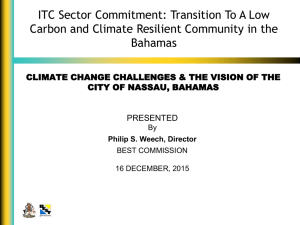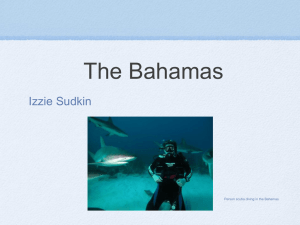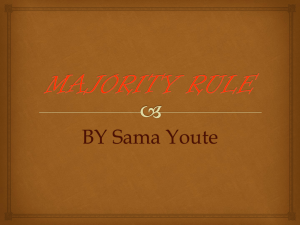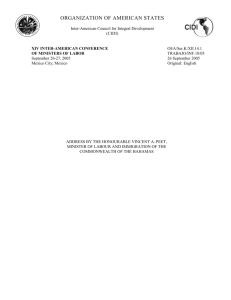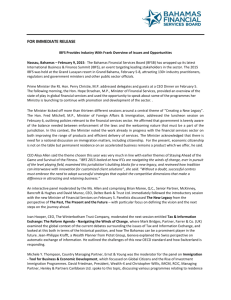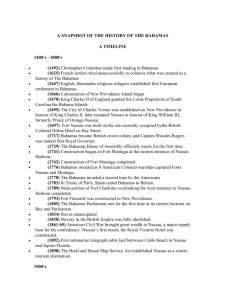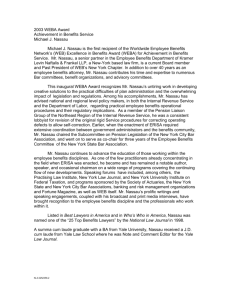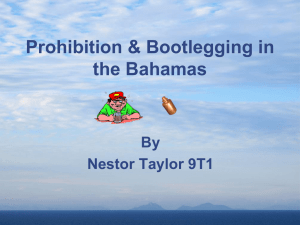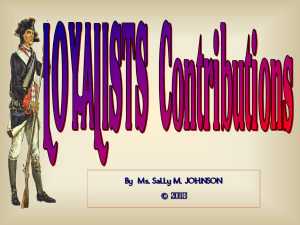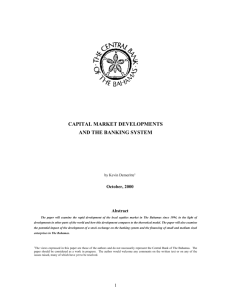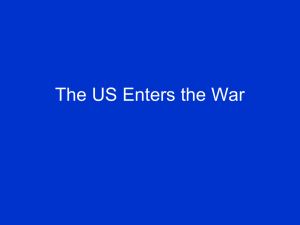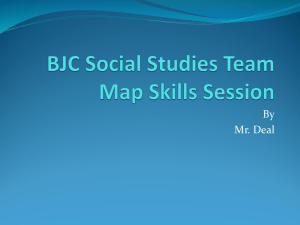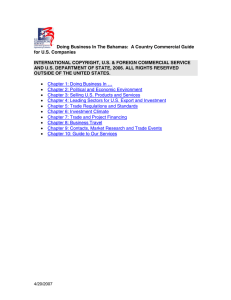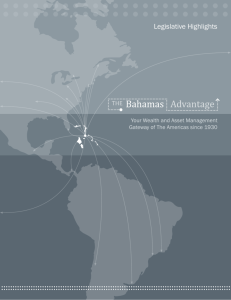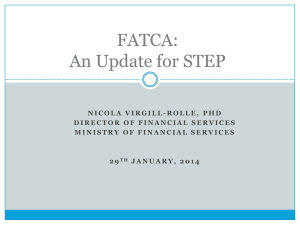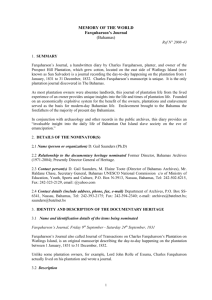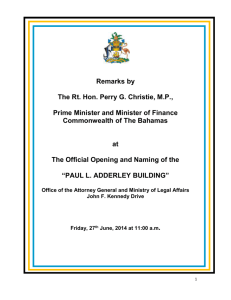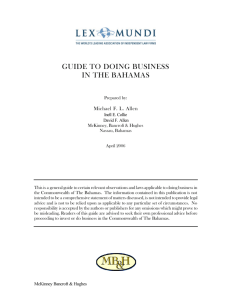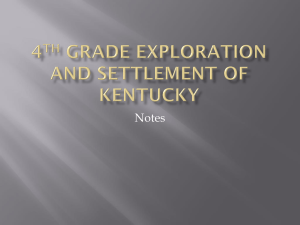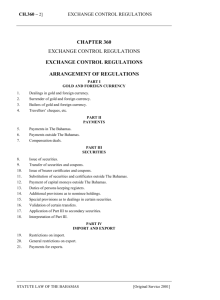File
advertisement
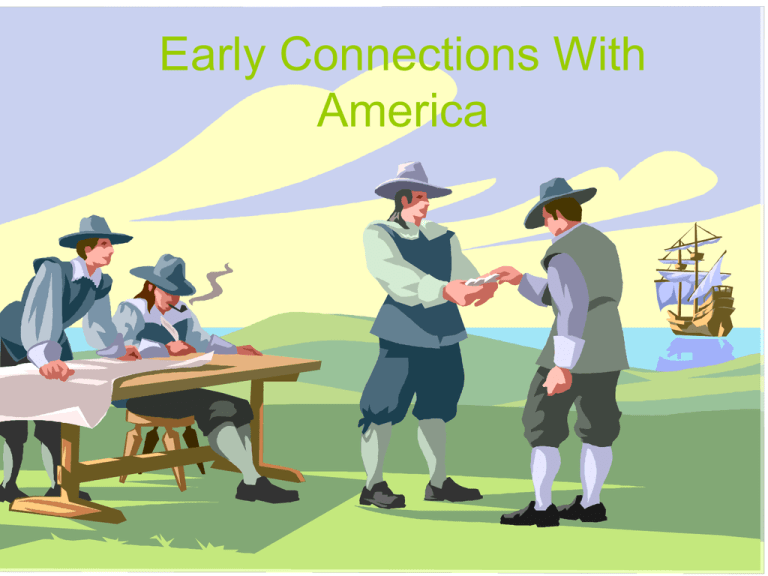
Early Connections With America Objectives At the end of the lesson students will be able to: 1. Locate America and the Bahamas on a map 2. Define listed vocabulary words 3. Discuss the importance of country relations 4. Outline the early connections between America and the Bahamas 5. Evaluate the advantages and disadvantages of the links that were established between the Bahamas and America Vocabulary • Wrecking – attracting ships to cays and reefs, then taking away the goods on board to sell • Consul – person appointed to represent the government in another country, who works in a consulate and is not as important as an ambassador • Embassy – part of a nation’s territory within another country; the ambassador and his staff work here • Ambassador –person appointed to represent the government in another country who works in an embassy • Blockade – access to a country’s ports are prevented • Smuggling – to carry forbidden goods into a country Early Connections With America • The people in The Bahamas have always been closely associated with America. In 1629, King Charles 1 of England gave the lands of the American Carolinas and The Bahamas to his chief legal advisor, Attorney-General Sir Robert Heath. By this grant, these lands became British territories. • In those early years settlers in The Bahamas looked to settlers in North America for advice, help and trade. Settlers in America sent help to the Adventurers. In return the Adventurers later gave money towards the building of the famous Harvard College in Massachusetts. • Many of our islands made a living by trading with the American colonies. Nassau became a second home to many American sea captains and pirates, and Bahamians sailed to and from Carolina, Virginia and Massachusetts. • The Lord Proprietors of Carolina were also Proprietors of The Bahamas. In 1670, Charles 11 of England had given The Bahamas to the Lord Proprietors of Carolina. This meant that the Proprietors took over The Bahamas to make money. But they had very little interest in the islands, and appointed Governors to rule over them. • The people who lived in The Bahamas were expected to pay some of their wages to the Proprietors in America. The Governors were supposed to collect this money, but often the people refused to pay. • The rule of the Lord Proprietors ended in 1718, when Woodes Rodgers was appointed as the first Royal Governor of the Bahamas. Nearly 60 years later, 1775, the American War of Independence began. Americans wanted to govern themselves, and not to be ruled by Britain. Ships of the American navy were sent to Nassau to take the powder and ammunition stored at Fort Nassau for two weeks. Then they set sail again, almost empty-handed. Not long afterwards, in 1782, New Providence was invaded again, this time by the Spaniards. The Governor was forced to surrender to the Spanish troops who took over the island. They remained there for nine months, until a Loyalist officer, Colonel Andrew Deveaux, attacked with forces from Harbor Island and Eleuthera recaptured the fort. Wrecking had been big business in The Bahamas since the first settlers arrived. Many ships were caught by the tricky currents around these islands, and swept ashore. Some ships were deliberately attracted on to the cays and reefs by false lights. Then the goods on board were carried away by the wreckers, and later sold. In the 1780’s, after the end of the American War of Independence, trade between America and The Bahamas increased – and so did the wrecks. Many Bahamian wreckers worked along the shores of Florida, and carried goods from the wrecks there to Nassau. The first official American representative or consul in Nassau arrived in 1821. By 1859 the consulate was known as the Consulate General. It was not until this century, on 10th July 1973, when The Bahamas became fully independent, that an embassy was established here, headed by an ambassador. The first steamships began a regular service between New York and Nassau in 1859. This was the start of our tourist industry. Many years of the American Civil War, all ships were prevented from using the ports in the southern states of America. This was a blockade. Nassau became very important at that time, supplying guns and ammunition to the troops of the Southern States, which were called The Confederacy. Nassau also exported cotton from the plantations in these states to Britain. In 1919 the American government passed an act, which prevented the American people from making, selling, importing or exporting liquors anywhere in the United States. So from 1920 to 1933, during the period that was called Prohibition, many people in The Bahamas were involved in smuggling liquor into America. During the Second World War (1939-1945), many American men went to Europe to join the troops there. It was a difficult time for farmers in America, because there were not enough people to work the land, so people from The Bahamas also went to America to work on the farms and in the food production factories there. This was the result of an agreement called The Project, or The Contract, arranged between the governments of the United States and The Bahamas.
